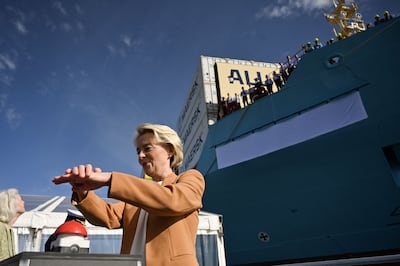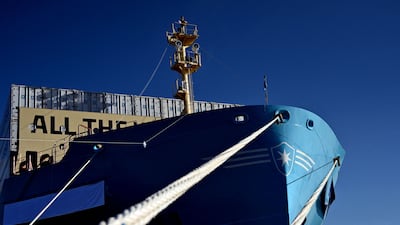Danish shipping and logistics company AP Moller-Maersk on Thursday held a naming ceremony for the world’s first methanol-enabled container vessel.
Maersk chairman Robert Uggla said while the 172m Laura Maersk is an inspiration to the shipping industry, the vessel also highlighted the challenges faced in securing enough green fuel to transition to low-emission fuels.
At the ceremony, held at a quay beside Maersk’s HQ in Copenhagen, was European Commission President Ursula von der Leyen, who said that “this moment embodies Europe's decision to pioneer the fight against climate change”.
“By successfully decarbonising shipping, we're not only promoting our fight against climate change, we're also creating new supply chains, new industries and thousands of new good jobs,” she said.
The Laura Maersk arrived in Copenhagen this week, after a maiden voyage that started in South Korea, where it was built by shipbuilder Hyundai Mipo Dockyard.
The ship, named after Maersk's first steamship that set sail in 1886, is set to be deployed in the Baltic Sea. "Similar to the steamship Laura, this ship represents an industrial revolution of a green character," said Mr Uggla.
It will be supplied in green methanol produced from manure over the next year by Norwegian state-owned energy company Equinor. This is scheduled to be replaced on the long term by Danish solar energy producer European Energy.
Green methanol, also known as "e-methanol", is composed of waste carbon dioxide (CO2) and "green hydrogen", which is created by using renewable energy to split water molecules.
AP Moller-Maersk, the world's second-largest container shipping firm, expects 25 of its vessels to sail on green methanol by the end of the decade – which would save 2.75 million tonnes of carbon dioxide each year.
The company plans to achieve net-zero greenhouse gas emissions in 2040 across the entire business, and transport a minimum of 25 per cent of ocean cargo using green fuels by 2030, compared to a 2020 baseline.
Despite its “modest size”, the Laura Maersk has inspired the rest of the industry to follow suit and more than 170 other ships – including cruise ships and tankers – are about to be built or retrofitted to sail on green methanol, said Mr Uggla.
But the challenge for Maersk and other shipping companies is now to secure enough renewable fuels, which cost two to three times more than conventional fuels.
The global production of green methanol is below 100,000 tonnes, according to Mr Uggla.

“The offtake requirements for green fuels from ourselves and others in shipping are huge,” said Mr Uggla at the naming ceremony.
“No company, no investor would be able to pull this off by themselves.
“More importantly, the industry needs strong regulatory frameworks and the right incentives.”
If all of its ships sailed on e-methanol – which is produced from renewable electricity – Maersk would need between 5 and 6 per cent of the world's existing supplies, the company's head of energy transition, Morten Bo Christiansen, said in a Ted Talk in July.
Current clean energy efforts are falling short of meeting global climate goals due to insufficient investment and deployment, according to a report published on Thursday by intergovernmental organisations the International Energy Agency, the International Renewable Energy Agency, together with the UN Climate Change High-Level Champions.
The logistics industry accounts for 11 per cent of global carbon emissions – including 3 per cent from the shipping sector.
Close to 90 per cent of the world's trade is ocean-based.


